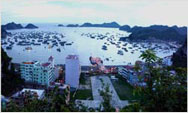You are here » Home » Telling Our Story
Photo & Caption
A Fresh Start in the Wake of Locusts

Photo: Richard Nyberg/USAID/Senegal
"At a fair in Touba Toul, a Senegalese merchant with her infant strapped to her back exchanges her produce for USAID-funded seed vouchers."
When massive swarms of hungry desert locusts descended upon peanut and millet fields in Senegal and Mauritania, farmers and herders knew they were in for a battle. Some sent their children, waiving their arms and sticks and shouting, into the fields, but within a day or two, it was all over. Their harvests were gone.
USAID drove back or eliminated many locusts with a fleet of small spraying aircraft. But after the pesticide settled, thousands of people living in rural areas faced an unsettling, uncertain future.
Bringing immediate and tangible support to the farmers and herders, USAID funded 44 seed-feed voucher fairs in Senegal and Mauritania. Seed-feed voucher fairs increase access to seed and animal feed by organizing markets for households affected by natural or human-made disasters, bringing together the buyers and vendors of seed or animal feed. USAID-sponsored vouchers are given to beneficiaries to exchange with registered vendors for seed and animal feed.
Teams distributed about 378 tons of seeds for agricultural crops and 374 tons of animal feed to 16,152 farmers and 6,257 herders in both countries. Not only did the vouchers bring necessary seeds for farmers to replant and resume their livelihoods, the fairs injected $214,000 and $168,000 into the local economies of Senegal and Mauritania, respectively, through the sale of locally-produced seed and feed.
In Touba Toul, Senegal, Ndior Ndaw used her $15 voucher to buy 15 kilograms of peanut seeds. “Since the locust infestation, we have harvested nothing,” she said. Ndior has tried to earn a bit of money selling beans and smoked fish, but it has been challenging to bring home enough to feed her husband and four young children. “These seeds are going to help us make a fresh start,” she said. “My husband will be very pleased.”
Print-friendly version of this page (533kb - PDF)
Click here for high-res photo
Back to Top ^ | 

